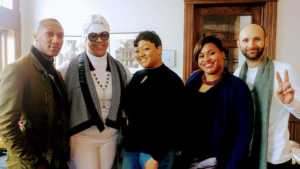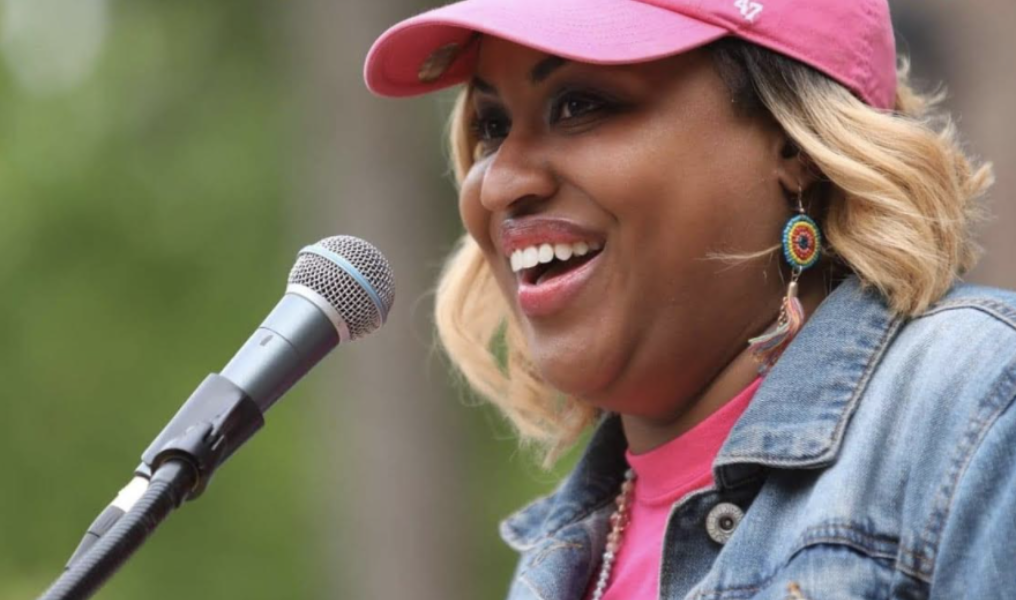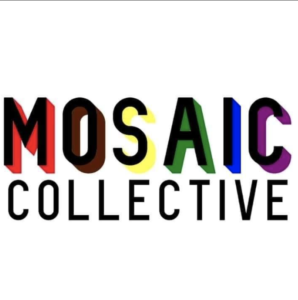Nicole Denson is the kind of person who would rather talk policy with Gov. Gretchen Whitmer than have her picture taken with Michigan's semi-celebrity chief executive. And she had just that opportunity at a Planned Parenthood stakeholders meeting where Denson was one of the only people of color. That was part of the problem. Denson's message: the needs of Detroiters, particularly Black women experiencing violence and sexual violence, were not being met. Whitmer asked Denson to leave her contact information with the governor's assistant.
"I was there with elected officials and there were all these people," Denson recalled. "But it did not deter me. I knew I had to get these people to listen."
As a result, "I got invited to more meetings," she said with a laugh.
Not afraid of entering uncomfortable spaces and speaking her truth, Denson recently launched a business, Mosaic Collective. Separately, she was also appointed to Planned Parenthood Advocates of Michigan's board of directors.
Mosaic Collective, whose mission is to advocate within and for BIPOC communities, is a business developed to foster education around marginalized communities through training, advocacy and outreach led by members of the BIPOC community. BIPOC is an acronym that stands for Black, Indigenous and People of Color.
Her experience with the governor was but one example of how Denson zeroes in on an issue, breaks it down and tackles it.
"Sometimes in these spaces and you're the only Black…or you're the only queer person, speaking up against injustice, it can feel heavy," she said. "And that's how [I envision] Mosaic … I really wanted us to use our collective power."
A recognized expert in providing advocacy to the most marginalized groups, Denson has been awarded for her efforts in ending violence in the BIPOC and LGBTQ communities.
"I identify as a proud, Black, queer and intersectional activist," explained Denson, who was born, raised and currently lives in Detroit. "So when I launched [the business] in 2019, it was after a long road. After my experience as program director at one of the largest advocacy programs in Michigan [where] I got to interact across Michigan and across the country, frankly, I saw the lack of BIPOC in these [leadership] positions. And to me, I think 2020 by itself has taught us, that the only way to effectively end violence and intergenerational trauma is to create brave and safe spaces for BIPOC individuals.
"I want Mosaic to be a foundation, a place where you can experience radical self-love, meaning that in order for us to [experience] liberation together, we have to love ourselves first," Denson continued.
Invited to feature her business at an LGBTQ holiday pop-up shop in December, Denson sounded pleased with the results.
"I wanted to actually uplift and showcase nonprofits and also LGBT BIPOC businesses. And so when they asked me I thought it would be a great opportunity for Mosaic Collective, yet I also wanted to highlight my close friend Rhiannon Chester."
Chester's business, Undercurrent Healing Arts, offers such alternative healing modalities as Reiki and crystal healing. The self-love kits she put together were very popular, Denson said.
"So I sold [the kits] at the pop-up shop. And it was wonderful. We did it socially distanced, by the way. We did not want to cancel it; we had to be creative once again. I wanted the proceeds to go Trans Sistas of Color Project Detroit because I know that they're doing life-savings services, which they've done throughout the pandemic."
Mentoring and Motherhood
One reason Denson wanted to launch Mosaic Collective was her desire to be a mentor again. She spoke about mentorship: on having them and on being one.
"My first mentor was of course my mother," Denson said. "My mother reminds me of like the straight version of Ruth Ellis. And what I mean by that is, early on, my mom opened up her doors to her friends, her family. … My house was seen as a safe haven for a lot of people. Unfortunately, not myself so to speak, in many different aspects."
A retired health care provider, Denson's mother modeled unconditional love.
"She discusses working through an AIDS pandemic and all of these things, and so it really showed me that you can help a person and not try to change who they are, who they love," she said.
Denson also spoke of a mentor with whom she worked at the domestic violence shelter Haven. Later, they worked together at Detroit's 12th Precinct. It was at that time that Denson first came out professionally.
"I didn't even know it then but I was in an abusive relationship," Denson said. "She was a mentor to me because I was still trying to help people, yet I didn't find my voice yet. And watching her navigate being a caregiver, being a mother, running support groups, doing PPOs, all these things — I was like, 'If this Black woman is fighting, I've got to fight with her.'"
When she came out, "My mentor did not change her love for me," Denson said.
Not only that, Denson was able to create "programming for us and by us," that is, the LGBTQ community.
"That's what mentorship looks like," Denson said. "It's creating a navigational system. A foundation, then moving out of the way."
That's what good parenting can look like, too. As the single mother to a 7-year-old daughter, that fact influences how Denson approaches her work.
"There's definitely still some stigma in 2020 about [LGBTQ people] being parents. About us being able to effectively take care of our children. A lot of people question our morals, question who we love. And that's heartbreaking.
"I don't think about just now," Denson continued. "I think about 10 years, 15, 20 — I think about legacy. She'll see in action how Mommy continues to get up no matter what obstacles she faces. She continues to speak out. I can't stop or give up because she's watching. But so are the naysayers with all of us. They're watching. And we're gonna keep going."

Denson (second from right), alongside fellow LGBTQ activists. From left to right: Ka'Juan Hill, Jey'nce Poindexter, Dani Woods, TJ Rogers. Courtesy photo.
Planned Parenthood and Beyond
Denson's daughter will also be watching her mother in her new role as a Planned Parenthood Advocates of Michigan board member.
Part truth and part rumor, Margaret Sanger's beliefs on race and eugenics have left many people of color wary of Planned Parenthood, the organization Sanger founded. But that's not the Planned Parenthood of today. And Denson is making every effort to center her advocacy work there not just on BIPOC issues but LGBTQ ones, too.
"The wonderful thing is that Planned Parenthood has heard me," Denson said. "And Planned Parenthood has heard us."
In her over 20-year career in activism, as a volunteer, advocate, facilitator and director, "I never felt that there was room for me on [a] board of directors," Denson said.
Yet now she recognizes how her previous roles, both paid and unpaid, prepared her for serving on Planned Parenthood's board.
"I just want people to heal," Denson said. "I want people to heal in however happy, however joyful way they can and I want us first to go through education.
"We have to educate ourselves; we have to have hard conversations; we have to educate our allies; we have to build community; we have to uplift each other," she continued. "And we have to build a foundation. Then we have to do education and outreach. … whether it's dealing with intimate partner violence, domestic violence, sexual violence … we need Planned Parenthood's services. Flat out. Like, there's no way around it."
Thus far, Denson is excited about her service with Planned Parenthood, where she knows her efforts are valued. She is working with Cassy Jones-McBryde who is Planned Parenthood's Black organizing program manager who put together a slate of BIPOC candidates to go through the endorsement process. Soon, Planned Parenthood will highlight LGBTQ candidates as well.
"This is just the beginning," stated Denson.
The year 2020, which Denson called "eye-opening" and "humbling," has represented a leap of faith for Denson. She left her post at Equality Michigan and devoted her time to growing her new business.
"I think I might be the only Black woman right now, who identifies as LGBT trying to start … an education and advocacy program," Denson said. "I know we have Affirmations; I know we have LGBT Detroit; we have Ruth Ellis Center. I am not trying to recreate the wheel. What I will say is there are not a lot of Black women — cis, trans — that are actually doing the work on the level I'm trying to."
Most LGBTQ activism and advocacy programs are "very white, gay male-centered," noted Denson, who wants her work to benefit the most impacted in the LGBT BIPOC community: trans women of color.
"Even when we get out of this [pandemic], the trauma from this is going to continue," Denson said. "And then therefore, we're going to need a brave, safe space — whether that's Zoom or whatever it may be — we have to create that and start having those conversations I talked about earlier and try to heal together to create access and opportunity for everybody in the LGBT community, not just certain people or those across 8 Mile, but to all of us. I know we're gonna be able to do it. And I want to help as much as I possibly can."
Learn more about Denson and the Mosaic Collective on its Facebook page.











